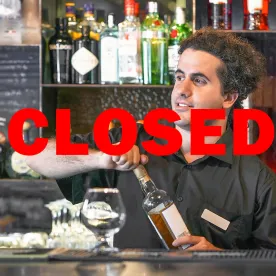UK government advice and the escalation of Coronavirus crisis have meant that many hospitality and leisure operators, including hotels, restaurants, pubs, some retailers and visitor attractions, are making difficult decisions to plan for reduced activity and reduced demand for several weeks, including in some cases, temporary suspension of activities and/or closure of premises/venues. There are a number of licensing, environmental and health and safety considerations to remember when planning for closures, as well as for re-opening. In particular: Health, Safety and Environmental Considerations • If you are closing business premises/ venues, remember to make suitable arrangements for the disposal of any waste in the building, especially any waste that may putrefy and/or attract vermin. Any waste that is produced on site may be stored for up to 12 months without a permit or a registered exemption, provided that it is stored in a secure place. • Arrangements to stop thieves or vandals from obtaining access to closed premises must also be considered. Any obvious risks within the premises should be assessed and mitigated, e.g. closing cellar trapdoors. In some circumstances, you may potentially owe a statutory duty of care to people who access your premises without your permission.
• If there is CCTV installed in premises that will not be operating, consider how will this be monitored and who will monitor it.
• If there are burglar and fire alarms in place, you should also agree processes in the event that they are activated, e.g. automatic notification to key management, the police and/ or the fire service.
• If you will be making arrangements for the premises to be visited/opened up from time to time, to check on condition, security and other arrangements, you should assess the risks that may be involved in this and any appropriate safeguarding arrangements, e.g. in relation to lone working, facilities for lighting (torches may be appropriate), provision of mobile telephones, etc.
• Consider whether your fire risk assessment needs to be updated. If you shut your premises, you will still be required under law to take general fire precautions to ensure that they are safe.
• If some of your employees will be working from home, consider undertaking a risk assessment in relation to home working. It is a legal requirement for employers to carry out a suitable and sufficient risk assessment, although it is unlikely to be feasible in current circumstances to send a trained health and safety assessor to visit an employee at home before they start homeworking. However, if the work is low-risk (e.g. office-type work), you may be able to provide guidance to them so that they can carry out their own assessment. The Institute of Safety and Health has published guidance on the subject, including a helpful checklist that could be used as the basis of a risk assessment.
• Regardless of whether you are shutting premises or reducing to a skeleton staff, consider updating your health and safety risk assessments to reflect this. Some risks will abate as a result of fewer staff and customers being on the premises, but others may potentially increase. For example, if you have any CO2 gas cylinders, you will need to consider how they will be managed.
• If you are shutting the premises to customers, but will continue having people living on the premises (e.g. in flats), assess what, if any, arrangements will need to be made for them so that they can still live there safely. For example, consider whether they will still have adequate means of fire escape.
• If you are maintaining a skeleton staff on the premises, assess the adequacy of first aid arrangements in place. If appropriate, there may need to be a suitably trained first aider on the premises.
• Consider whether the skeleton staff will have adequate access to safe work equipment that they need to carry out their jobs, and adequate welfare facilities, such as toilets and handwashing facilities.
• If you are maintaining a skeleton staff and/or allowing employees to work from home, check your insurance policy to see if there is any relevant requirements to notify them of this under the policy
• If you operate a hotel with a spa/swimming pool, advice suggests that the virus would be inactivated due to levels of chlorine in the pool water. However, whilst customers are not in the water (e.g. in changing rooms, locker areas or showers), then the same risks would apply as they would anywhere else.
• If you run a pool, spa or gym, and guests or visitors still want to use the facilities, you will owe them a duty of care under health and safety legislation to ensure so far as is reasonably practicable, their health and safety, so you should assess the risks associated with this in all areas in accordance with the advice, including current advice on social distancing.
• For business premises/venues that are due to re-open, you will also need to assess any potential risks to health and safety, in consideration of matters such as lack of maintenance and hygiene/cleaning during period of closure, expired safety certification and/ or overdue inspections or tests. In particular, if the water system has been inactive, you may wish to consider carrying out legionella testing.
• If it is possible that your premises may be used by a third party for another purpose on a temporary basis (for example, for accommodation or medical treatment) consider which party will have responsibility for environmental, health and safety obligations.
Licensing Considerations
• If you are considering providing a delivery service of food and alcohol instead of, or in addition to, service on the premises, remember that your licence needs to cover you for sales of alcohol for consumption “off” the premises, as well as “on”. Check your conditions to be sure.
• Also remember to check if you have different/restricted hours for “off sales” that would apply to any takeaway or delivery services.
• Remember that if there is no designated premises supervisor (DPS), there is no authority to sell alcohol. Therefore, if you are in the unfortunate position of having to make redundancies, remember that where a DPS has been redundant, you will need to make an application to name another personal licence holder as DPS to allow continuity of service, or in the event of closure, before re-opening.
• Keep under review the number of employees who are personal licence holders (in each premises, where you operate multiple premises/venues) to ensure proper supervision of alcohol sales.
• It is not yet clear how individual licensing authorities will continue to operate over coming weeks. It is very likely that there will be a significant delay in receiving hard copy licences (premises or personal).
• However, as the majority of licensing authorities have the ability to accept applications electronically, we do not anticipate any particular issues with serving urgent applications (e.g. for DPS changes).
• If a hearing is required (e.g. in the event of objections to an outstanding application), it is possible that the hearing may be adjourned, unless the authority will agree to deal with the hearing remotely (e.g. via telephone or video), which is the process being adopted in some courts.
• If you are licensed for civil ceremonies and partnerships, remember that even if the couple wishes to continue with the wedding celebrations, there may be an issue with availability of registrars.
• Even if you are temporarily suspending activities and/or closing premises, remember that annual fees will still fall due for payment on the anniversary of the original grant of the premises licence (unless the licence is surrendered). If annual fees are not paid, they are recoverable as a debt; and licensing authorities are required to suspend premises licences for non-payment (which would remove authority for sales of alcohol/other licensed activities). Therefore, it is essential to ensure payment to allow re-opening in due course.
• Do not surrender your premises licence, unless it is certain that you will not be operating the premises for licensable activities again in the future. Once a licence is surrendered, it cannot be resurrected after 21 days have passed. Therefore, if you wanted to start providing licensable activities again, you would have to apply for a new licence (with all of the associated costs and delays and no guarantee that a new licence will be granted).
• If you are remaining open for business, check your licence conditions and assess whether you can still comply. Some conditions require minimum numbers of personnel at certain times, e.g. door supervisors and/or stewards and/ or personal licence holders. Although we would expect many authorities to take a practical approach in such unprecedented times (it would be difficult to demonstrate public interest in a technical breach), non-compliance may cause difficulties in the event, e.g. of an incident of crime and disorder, leading to a police investigation and conclusion that part of the reason was the removal of door supervisors, e.g. below the numbers required under the licence conditions.
• If you operate in more than one UK country, the government approach, or timing, may be different. Remember that licensing laws are different in Scotland and Northern Ireland, to those in England and Wales. Therefore, you may require a different approach and separate advice in relation to each jurisdiction.
General
• It has been reported that nine out of 10 businesses do not have adequate policies in place for handling a pandemic. Licensed businesses need to understand what they should be doing to mitigate the impact of the coronavirus on business operations, including legal requirements, financial health, staff wellbeing, commercial obligations, funding, director’s duties, supply chain issues and much more.
• Contingency plans can provide a structure for management and implementation of measures intended for such mitigation. However, issues and government responses connected with the coronavirus have escalated, and are still escalating at such a rate that such plans need to be devised quickly and continually adapted to reflect updated advice over a period of time.






 />i
/>i
